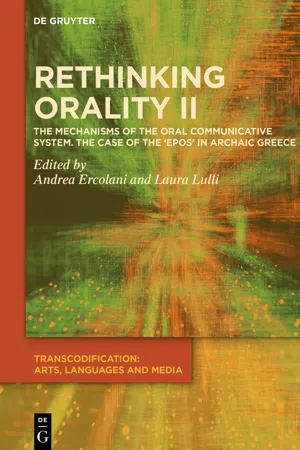
Rethinking Orality II
The Mechanisms of the Oral Communication System in the Case of the Archaic Epos
Andrea Ercolani, Laura Lulli, Andrea Ercolani, Laura Lulli
- 228 Seiten
- English
- ePUB (handyfreundlich)
- Über iOS und Android verfügbar
Rethinking Orality II
The Mechanisms of the Oral Communication System in the Case of the Archaic Epos
Andrea Ercolani, Laura Lulli, Andrea Ercolani, Laura Lulli
Über dieses Buch
This is the second volume on the mechanisms of oral communication in ancient Greece, focused on epic poetry, a genre with deep roots in orality. Considering the critical debate about orality and its influence on the composition, diffusion and transmission of the archaic epic poems, the survey provides a reconsideration and a reassessment of the traces of orality in the archaic epic poetry, following their adaptation in the synchronic and diachronic changes of the communicative system. Combining the methods of cognitive science, and the historical and literary analysis of the texts, the research explores the complexity of the literary message of the Greek epic poetry, highlighting its position in a system of oral communication. The consideration of structural and formal aspects, i.e. the traces of orality in the narrative architecture, in the epic diction, in the meter and the formulaic system, as well as the vestiges of the mixture of orality and writing, allows to reconstruct a dynamic frame of communicative modalities which influenced and enriched the archaic epic poetry, providing it with expressive potentialities destined to a longlasting permanence in the history of the genre.
Häufig gestellte Fragen
Information
A Cyclic Theme in the Odyssey: The Oresteia in Zeus’ Speech (1, 28 – 43)
Abstract
1 The Homeric Poems and the Epic Cycle
Photius, Bibl. 239, 17 – 197διαλαμβάνει δὲ καὶ περὶ τοῦ λεγομένου ἐπικοῦ κύκλου, ὃς ἄρχεται μὲν ἐκ τῆς Οὐρανοῦ καὶ Γῆς μυθολογουμένης μίξεως, ἐξ ἧς αὐτῷ καὶ τρεῖς παῖδας ἑκατοντάχειρας καὶ τρεῖς γεννῶσι Κύκλωπας. διαπορεύεται δὲ τά τε ἄλλως περὶ θεῶν τοῖς Ἕλλησι μυθολογούμενα καὶ εἴ πού τι καὶ πρὸς ἱστορίαν ἐξαληθίζεται. καὶ περατοῦται ὁ ἐπικὸς κύκλος ἐκ διαφόρων ποιητῶν συμπληρούμενος, μέχρι τῆς ἀποβάσεως Ὀδυσσέως τῆς εἰς Ἰθάκην, ἐν ᾗ ὑπὸ τοῦ παιδὸς Τηλεγόνου ἀγνοοῦντος κτείνεται.
Proclus talks about what is called the epic cycle, which starts from the mythological union between Heaven and Mother Earth. This union generated three children with a hundred hands each and three Cyclops. Proclus examines the legends of the Greek people about the gods and their relationship with the historical truth. The epic cycle, made up by several poets, ends with the arrival of Odysseus in Ithaca, where he dies, killed by his son Telegonus, who does not know him.
Inhaltsverzeichnis
- Title Page
- Copyright
- Contents
- Mind-based Research Meets the Homeric Epics: Looking Again at Communicative Strategies in the Homeric Epics
- Interformulaic Homer: Evidence from the “Wild” Papyri
- Two Chronological Extremes of the Homeric Language: πρόφρασσα and εἶπα
- Technologies of Orality: Formularity, Meter, and Kunstsprache in Homer
- A Cyclic Theme in the Odyssey: The Oresteia in Zeus’ Speech (1, 28 – 43)
- Audiences of the Prophecy of Tiresias in Odyssey Book XI
- Traces of Orality in the Histories: The Homeric ‘Heritage’ in Herodotean Battles and Speeches
- Some Reflections on Orality and Epic Poetry in Ancient Literary Criticism
- Homer and ‘the Elegists’: an Ancient Construction of Difference
- Paradoxes of ‘Orality’: A Comparison between Homeric Oral Poetry and the Heroic and Courtly Epics in Middle High German
- Epos and Orality: Conclusive Remarks and Open Questions
- Index Notable Things
- Index Discussed Passages